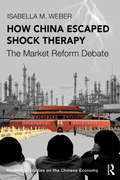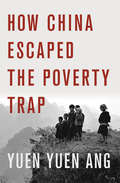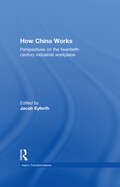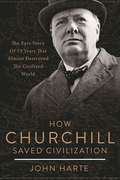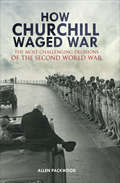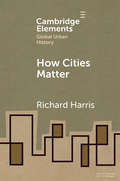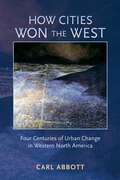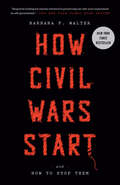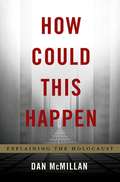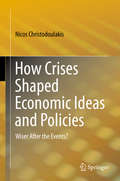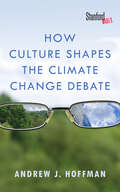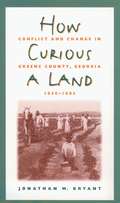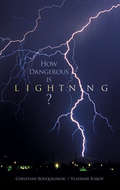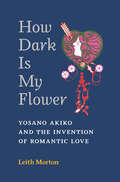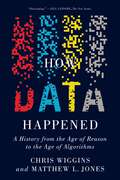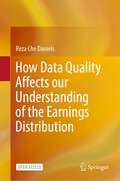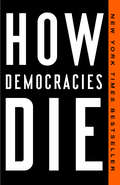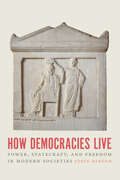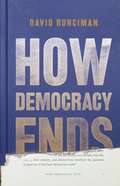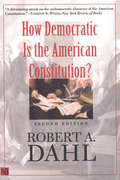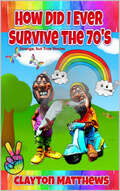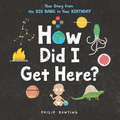- Table View
- List View
How China Escaped Shock Therapy: The Market Reform Debate (Routledge Studies on the Chinese Economy)
by Isabella M. WeberChina has become deeply integrated into the world economy. Yet, gradual marketization has facilitated the country’s rise without leading to its wholesale assimilation to global neoliberalism. This book uncovers the fierce contest about economic reforms that shaped China’s path. In the first post-Mao decade, China’s reformers were sharply divided. They agreed that China had to reform its economic system and move toward more marketization—but struggled over how to go about it. Should China destroy the core of the socialist system through shock therapy, or should it use the institutions of the planned economy as market creators? With hindsight, the historical record proves the high stakes behind the question: China embarked on an economic expansion commonly described as unprecedented in scope and pace, whereas Russia’s economy collapsed under shock therapy. Based on extensive research, including interviews with key Chinese and international participants and World Bank officials as well as insights gleaned from unpublished documents, the book charts the debate that ultimately enabled China to follow a path to gradual reindustrialization. Beyond shedding light on the crossroads of the 1980s, it reveals the intellectual foundations of state-market relations in reform-era China through a longue durée lens. Overall, the book delivers an original perspective on China’s economic model and its continuing contestations from within and from without.
How China Escaped the Poverty Trap
by Yuen Yuen AngBefore markets opened in 1978, China was an impoverished planned economy governed by a Maoist bureaucracy. In just three decades it evolved into the world's second-largest economy and is today guided by highly entrepreneurial bureaucrats. In How China Escaped the Poverty Trap, Yuen Yuen Ang explains this astonishing metamorphosis. Rather than insist that either strong institutions of good governance foster markets or that growth enables good governance, Ang lays out a new, dynamic framework for understanding development broadly. Successful development, she contends, is a coevolutionary process in which markets and governments mutually adapt.By mapping this coevolution, Ang reveals a startling conclusion: poor and weak countries can escape the poverty trap by first harnessing weak institutions—features that defy norms of good governance—to build markets. Further, she stresses that adaptive processes, though essential for development, do not automatically occur. Highlighting three universal roadblocks to adaptation, Ang identifies how Chinese reformers crafted enabling conditions for effective improvisation.How China Escaped the Poverty Trap offers the most complete synthesis to date of the numerous interacting forces that have shaped China’s dramatic makeover and the problems it faces today. Looking beyond China, Ang also traces the coevolutionary sequence of development in late medieval Europe, antebellum United States, and contemporary Nigeria, and finds surprising parallels among these otherwise disparate cases. Indispensable to all who care about development, this groundbreaking book challenges the convention of linear thinking and points to an alternative path out of poverty traps.
How China Works: Perspectives on the Twentieth-Century Industrial Workplace (Routledge Studies in Asia's Transformations #Vol. 12)
by Jacob EyferthSpanning the whole of the twentieth century, How China Works examines the labour issues surrounding the workplace in China in both the Republican and People's Republic epochs. The international team of contributors treat China's twentieth-century revolution as an industrial revolution, stressing that China's recent emergence as the new workshop of the world was a gradual change, and not a recent phenomena led by external forces. Providing the reader with extensive ethnographic research on topics such as culture and community in the workplace, the rural-urban divide, industrialization, subcontracting and employment practices, How China Works really does ground the study of Chinese work in the daily interactions in the workplace, the labour process and the micropolitics of work.
How Churchill Saved Civilization: The Epic Story of 13 Years That Almost Destroyed the Civilized World
by John HarteHow Churchill Saved Civilization resolves the lingering mysteries surrounding the causes of the Second World War, and what transpired during the war to bring its end result. It proposes answers to such questions as "Why were the Allies unprepared?", "Why did France collapse so quickly?", "Why didn't the British government accept Hitler's peace proposals?" and "Why did the Germans allow Hitler to obtain life and death control over them?"But the book's main purpose is to provide an account of Winston Churchill's actions and their intended consequences - as well as some of the unintended ones - for readers who are unlikely to read a military history book of 800 pages. The author has pared down the details of this at once fascinating and frightening story to an accessible length of how the world nearly ended in the 1940s. How Churchill Saved Civilization was written in honor of all those who sacrificed their lives in the War, and to caution readers that it could very easily happen again, as key factors like complacency, ignorance, and weakness continue to play a role in international diplomacy.Skyhorse Publishing, as well as our Arcade imprint, are proud to publish a broad range of books for readers interested in history--books about World War II, the Third Reich, Hitler and his henchmen, the JFK assassination, conspiracies, the American Civil War, the American Revolution, gladiators, Vikings, ancient Rome, medieval times, the old West, and much more. While not every title we publish becomes a New York Times bestseller or a national bestseller, we are committed to books on subjects that are sometimes overlooked and to authors whose work might not otherwise find a home.
How Churchill Waged War: The Most Challenging Decisions of the Second World War
by Allen PackwoodAn analytical investigation into Prime Minister Winston Churchill&’s decision-making process during every stage of World War II. When Winston Churchill accepted the position of Prime Minister in May 1940, he insisted in also becoming Minister of Defence. This, though, meant that he alone would be responsible for the success or failure of Britain&’s war effort. It also meant that he would be faced with many monumental challenges and utterly crucial decisions upon which the fate of Britain and the free world rested. With the limited resources available to the UK, Churchill had to pinpoint where his country&’s priorities lay. He had to respond to the collapse of France, decide if Britain should adopt a defensive or offensive strategy, choose if Egypt and the war in North Africa should take precedence over Singapore and the UK&’s empire in the East, determine how much support to give the Soviet Union, and how much power to give the United States in controlling the direction of the war. In this insightful investigation into Churchill&’s conduct during the Second World War, Allen Packwood, BA, MPhil (Cantab), FRHistS, the Director of the Churchill Archives Centre, enables the reader to share the agonies and uncertainties faced by Churchill at each crucial stage of the war. How Churchill responded to each challenge is analyzed in great detail and the conclusions Packwood draws are as uncompromising as those made by Britain&’s wartime leader as he negotiated his country through its darkest days.
How Cities Matter (Elements in Global Urban History)
by Richard HarrisMost historians and social scientists treat cities as mere settings. In fact, urban places shape our experience. There, daily life has a faster, artificial rhythm and, for good and ill, people and agencies affect each other through externalities (uncompensated effects) whose impact is inherently geographical. In economic terms, urban concentration enables efficiency and promotes innovation while raising the costs of land, housing, and labour. Socially, it can alienate or provide anonymity, while fostering new forms of community. It creates congestion and pollution, posing challenges for governance. Some effects extend beyond urban borders, creating cultural change. The character of cities varies by country and world region, but it has generic qualities, a claim best tested by comparing places that are most different. These qualities intertwine, creating built environments that endure. To fully comprehend such path dependency, we need to develop a synthetic vision that is historically and geographically informed.
How Cities Won the West: Four Centuries of Urban Change in Western North America (Histories of the American Frontier Series)
by Carl AbbottCities rather than individual pioneers have been the driving force in the settlement and economic development of the western half of North America. Throughout the seventeenth, eighteenth, and nineteenth centuries, western urban centers served as starting points for conquest and settlement. As these frontier cities matured into metropolitan centers, they grew from imitators of eastern culture and outposts of eastern capital into independent sources of economic, cultural, and intellectual change.From the Gulf of Alaska to the Mississippi River and from the binational metropolis of San Diego-Tijuana to the Prairie Province capitals of Canada, Carl Abbott explores the complex urban history of western Canada and the United States. The evolution of western cities from stations for exploration and military occupation to contemporary entry points for migration and components of a global economy reminds us that it is cities that won the West. And today, as cultural change increasingly moves from west to east, Abbott argues that the urban West represents a new center from which emerging patterns of behavior and changing customs will help to shape North America in the twenty-first century.
How Civil Wars Start: And How to Stop Them
by Barbara F. WalterA leading political scientist examines the dramatic rise in violent extremism around the globe and sounds the alarm on the increasing likelihood of a second civil war in the United States. <p><p> Political violence rips apart several towns in southwest Texas. A far-right militia plots to kidnap the governor of Michigan and try her for treason. An armed mob of Trump supporters and conspiracy theorists storms the U.S. Capitol. Are these isolated incidents? Or is this the start of something bigger? Barbara F. Walter has spent her career studying civil conflict in places like Iraq and Sri Lanka, but now she has become increasingly worried about her own country. <p><p> Perhaps surprisingly, both autocracies and healthy democracies are largely immune from civil war; it’s the countries in the middle ground that are most vulnerable. And this is where more and more countries, including the United States, are finding themselves today. <p><p> Over the last two decades, the number of active civil wars around the world has almost doubled. Walter reveals the warning signs—where wars tend to start, who initiates them, what triggers them—and why some countries tip over into conflict while others remain stable. Drawing on the latest international research and lessons from over twenty countries, Walter identifies the crucial risk factors, from democratic backsliding to factionalization and the politics of resentment. A civil war today won’t look like America in the 1860s, Russia in the 1920s, or Spain in the 1930s. It will begin with sporadic acts of violence and terror, accelerated by social media. It will sneak up on us and leave us wondering how we could have been so blind. <p><p> In this urgent and insightful book, Walter redefines civil war for a new age, providing the framework we need to confront the danger we now face—and the knowledge to stop it before it’s too late.
How Could This Happen: Explaining the Holocaust
by Dan McmillanThe Holocaust is the defining event of the twentieth century - and perhaps all of modern history. Yet for too long, we have ignored the vital question of how and why such a monstrous event could have happened at all. Now, in How Could This Happen, historian Dan McMillan distills the existing Holocaust research into a cogent explanation of the genocide’s causes, revealing how a once progressive society like Germany could commit murder on such a massive scale. Countless barriers stand between stable societies and genocide, McMillan explains, but in Germany these buffers began to topple well before World War II. From Hitler’s meteoric rise to deep-rooted European anti-Semitism to the dehumanizing effects of World War I, McMillan uncovers the many factors that made the Holocaust possible. Persuasive and compelling, How Could This Happen illustrates how a perfect storm of bleak circumstances, malevolent ideas, and societal upheaval unleashed history’s most terrifying atrocity.
How Crises Shaped Economic Ideas and Policies
by Nicos ChristodoulakisThis book explores how successful the various tenets of economic thought have been in prognosticating or remedying economic crises. Examining key episodes in economic history, from famines in antiquity to present-day financial collapse, the author finds that several theories failed to cope with a crisis and lost their academic impact. The author also presents cases in which major theoretical innovations were achieved after the experience of a crisis as well as cases where a completely new theory was needed to explain and face the events. This book will appeal to researchers and scholars interested in understanding how theoretical developments in economics are affected by real-world economic crises.
How Culture Shapes the Climate Change Debate
by Andrew J. HoffmanThough the scientific community largely agrees that climate change is underway, debates about this issue remain fiercely polarized. These conversations have become a rhetorical contest, one where opposing sides try to achieve victory through playing on fear, distrust, and intolerance. At its heart, this split no longer concerns carbon dioxide, greenhouse gases, or climate modeling; rather, it is the product of contrasting, deeply entrenched worldviews. This brief examines what causes people to reject or accept the scientific consensus on climate change. Synthesizing evidence from sociology, psychology, and political science, Andrew J. Hoffman lays bare the opposing cultural lenses through which science is interpreted. He then extracts lessons from major cultural shifts in the past to engender a better understanding of the problem and motivate the public to take action. How Culture Shapes the Climate Change Debate makes a powerful case for a more scientifically literate public, a more socially engaged scientific community, and a more thoughtful mode of public discourse.
How Curious a Land
by Jonathan M. BryantThe story of the Civil War and Reconstruction in Greene County, Georgia, is a remarkable tale of both fundamental change and essential continuity. In How Curious a Land, Jonathan Bryant follows the county's social, economic, and legal transformation from a wealthy, self-sufficient plantation economy based on slavery to a largely impoverished, economically dependent community dominated by a new commercial class of merchants and lawyers. Emancipated slaves made up two-thirds of the county's population at the end of the Civil War, and thanks to an able, charismatic, and politically active leadership, they enjoyed early success in pressing for their rights. But their gains, says Bryant, were only temporary, because the white elite retained control of the legal system and used it effectively against blacks. Law also helped shape the course of economic change as, for example, postbellum laws designed to benefit the new commercial elite ensured poverty for most of the county's small farmers, both black and white, by relegating them to the status of sharecroppers and tenants. As a result, the county's wealth, though greatly diminished in the postbellum years, remained concentrated in the hands of a small elite.
How Dangerous Is Lightning?
by Vladimir Rakov Christian BouquegneauLightning strikes somewhere on the surface of the earth about 100 times every second, and current observations indicate a significant increase in activity in the coming years. This illustrated survey explores the history of lightning, from ancient to modern times. Mythology and observations of lightning damage constituted the extent of lightning history until the Enlightenment period, when Benjamin Franklin, Thomas-François Dalibard, and others began applying a scientific approach. Detailed studies began at the dawn of the twentieth century, with the advent of modern instrumentation. This volume presents up-to-date views of thunderstorm clouds, lightning phenomenology and parameters, spatial distribution of lightning activity, and the global electric circuit. It explores the physical effects of lightning as well as secondary effects, lightning protection, and new frontiers in the understanding of lightning. An information-based study, this book is appropriate for classroom use as well as for popular science readers of all ages.
How Dark Is My Flower: Yosano Akiko and the Invention of Romantic Love (Michigan Monograph Series in Japanese Studies #98)
by Leith MortonThe poetry of Yosano Akiko covers all the many and varied aspects of the experience of love—from early romantic encounters between the lover and beloved to the intimate pleasures of mutual infatuation and then true love. The journey outlined in Akiko’s verse also grapples with jealousy and unrequited passion, as Akiko’s poem-narrative treats the rivalry between herself and her best friend, the poet Yamakawa Tomiko, for the affection of the dashing young literary lion, Yosano Tekkan, who later became Akiko’s husband. Thus, How Dark Is My Flower: Yosano Akiko and the Invention of Romantic Love tells a number of stories: a real-life romance unfolds in the poetry of these three poets examined in the book, as well as the story of the journey from romanticism to modernism undertaken by early 20th century Japanese poetry. How Dark Is My Flower emphasizes the astonishing innovations in diction and style, not to mention content, in Akiko’s work that transformed the tanka genre from a hidebound and conservative mode of verse to something much more daring and modern. This book pays particular attention to poetry, particularly the tanka genre, in the evolution of modernism in Japanese literature and breaks new ground in the study of modern Japanese literature by examining the invention and evolution of the concept of romantic love.
How Data Happened: A History from the Age of Reason to the Age of Algorithms
by Matthew L. Jones Chris Wiggins“Fascinating.” —Jill Lepore, The New Yorker A sweeping history of data and its technical, political, and ethical impact on our world. From facial recognition—capable of checking people into flights or identifying undocumented residents—to automated decision systems that inform who gets loans and who receives bail, each of us moves through a world determined by data-empowered algorithms. But these technologies didn’t just appear: they are part of a history that goes back centuries, from the census enshrined in the US Constitution to the birth of eugenics in Victorian Britain to the development of Google search. Expanding on the popular course they created at Columbia University, Chris Wiggins and Matthew L. Jones illuminate the ways in which data has long been used as a tool and a weapon in arguing for what is true, as well as a means of rearranging or defending power. They explore how data was created and curated, as well as how new mathematical and computational techniques developed to contend with that data serve to shape people, ideas, society, military operations, and economies. Although technology and mathematics are at its heart, the story of data ultimately concerns an unstable game among states, corporations, and people. How were new technical and scientific capabilities developed; who supported, advanced, or funded these capabilities or transitions; and how did they change who could do what, from what, and to whom? Wiggins and Jones focus on these questions as they trace data’s historical arc, and look to the future. By understanding the trajectory of data—where it has been and where it might yet go—Wiggins and Jones argue that we can understand how to bend it to ends that we collectively choose, with intentionality and purpose.
How Data Quality Affects our Understanding of the Earnings Distribution
by Reza Che DanielsThis open access book demonstrates how data quality issues affect all surveys and proposes methods that can be utilised to deal with the observable components of survey error in a statistically sound manner. This book begins by profiling the post-Apartheid period in South Africa's history when the sampling frame and survey methodology for household surveys was undergoing periodic changes due to the changing geopolitical landscape in the country. This book profiles how different components of error had disproportionate magnitudes in different survey years, including coverage error, sampling error, nonresponse error, measurement error, processing error and adjustment error. The parameters of interest concern the earnings distribution, but despite this outcome of interest, the discussion is generalizable to any question in a random sample survey of households or firms. This book then investigates questionnaire design and item nonresponse by building a response propensity model for the employee income question in two South African labour market surveys: the October Household Survey (OHS, 1997-1999) and the Labour Force Survey (LFS, 2000-2003). This time period isolates a period of changing questionnaire design for the income question. Finally, this book is concerned with how to employee income data with a mixture of continuous data, bounded response data and nonresponse. A variable with this mixture of data types is called coarse data. Because the income question consists of two parts -- an initial, exact income question and a bounded income follow-up question -- the resulting statistical distribution of employee income is both continuous and discrete. The book shows researchers how to appropriately deal with coarse income data using multiple imputation. The take-home message from this book is that researchers have a responsibility to treat data quality concerns in a statistically sound manner, rather than making adjustments to public-use data in arbitrary ways, often underpinned by undefensible assumptions about an implicit unobservable loss function in the data. The demonstration of how this can be done provides a replicable concept map with applicable methods that can be utilised in any sample survey.
How Democracies Die: What History Reveals About Our Future
by Daniel Ziblatt Steven Levitsky<P>A bracing, revelatory look at the demise of liberal democracies around the world—and a road map for rescuing our own Donald Trump’s presidency has raised a question that many of us never thought we’d be asking: Is our democracy in danger? <P>Harvard professors Steven Levitsky and Daniel Ziblatt have spent more than twenty years studying the breakdown of democracies in Europe and Latin America, and they believe the answer is yes. Democracy no longer ends with a bang—in a revolution or military coup—but with a whimper: the slow, steady weakening of critical institutions, such as the judiciary and the press, and the gradual erosion of long-standing political norms. <P>The good news is that there are several exit ramps on the road to authoritarianism. The bad news is that, by electing Trump, we have already passed the first one. Drawing on decades of research and a wide range of historical and global examples, from 1930s Europe to contemporary Hungary, Turkey, and Venezuela, to the American South during Jim Crow, Levitsky and Ziblatt show how democracies die—and how ours can be saved. <P><b>A New York Times Bestseller</b>
How Democracies Live: Power, Statecraft, and Freedom in Modern Societies
by Stein RingenTimes have not been kind to democracy. This book is in its defense. In the new century, the triumph of democracy at the end of the Cold War turned to retrenchment. The core democracies, in America and Britain, succumbed to polarization and misrule. Dictatorships, such as China, made themselves assertive. New democracies in Central Europe turned to muddled ideologies of “illiberal democracy.” In this book, Stein Ringen offers a meditation on what democracy is, the challenges it faces, and how it can be defended. Ringen argues that democracy must be rooted in a culture that supports the ability of citizens to exchange views and information among themselves and with their rulers. Drawing on the ideas of Machiavelli, Aristotle, Tocqueville, Max Weber, and others, Ringen shows how power is the fuel of government, and statecraft turns power into effective rule. Democracy should prize freedom and minimizing unfairness, especially poverty. Altogether, Ringen offers powerful insight on the meaning of democracy, including a new definition, and how countries can improve upon it and make it function more effectively. Timely and thought-provoking, How Democracies Live is a sober reminder of the majesty of the democratic enterprise.
How Democracy Ends
by David RuncimanHow will democracy end? And what will replace it? A preeminent political scientist examines the past, present, and future of an endangered political philosophySince the end of World War II, democracy's sweep across the globe seemed inexorable. Yet today, it seems radically imperiled, even in some of the world's most stable democracies. How bad could things get?In How Democracy Ends, David Runciman argues that we are trapped in outdated twentieth-century ideas of democratic failure. By fixating on coups and violence, we are focusing on the wrong threats. Our societies are too affluent, too elderly, and too networked to fall apart as they did in the past. We need new ways of thinking the unthinkable--a twenty-first-century vision of the end of democracy, and whether its collapse might allow us to move forward to something better.A provocative book by a major political philosopher, How Democracy Ends asks the most trenchant questions that underlie the disturbing patterns of our contemporary political life.
How Democratic Is the American Constitution?
by Robert A. DahlDahl starts with the assumption that the legitimacy of the American Constitution derives solely from its utility as an instrument of democratic governance. Dahl demonstrates that, due to the context in which it was conceived, our Constitution came to incorporate significant antidemocratic elements. Because the Framers of the Constitution had no relevant example of a democratic political system on which to model the American government, many defining aspects of our political system were implemented as a result of short-sightedness or last-minute compromise.
How Democratic Is the American Constitution?
by Robert A. DahlIn this provocative book, one of our most eminent political scientists poses the question, "Why should we uphold our constitution?" The vast majority of Americans venerate the American Constitution and the principles it embodies, but many also worry that the United States has fallen behind other nations on crucial democratic issues, including economic equality, racial integration, and women's rights. Robert Dahl explores this vital tension between the Americans' belief in the legitimacy of their constitution and their belief in the principles of democracy. Dahl starts with the assumption that the legitimacy of the American Constitution derives solely from its utility as an instrument of democratic governance. Dahl demonstrates that, due to the context in which it was conceived, our constitution came to incorporate significant antidemocratic elements. Because the Framers of the Constitution had no relevant example of a democratic political system on which to model the American government, many defining aspects of our political system were implemented as a result of short-sightedness or last-minute compromise. Dahl highlights those elements of the American system that are most unusual and potentially antidemocratic: the federal system, the bicameral legislature, judicial review, presidentialism, and the electoral college system. The political system that emerged from the world's first great democratic experiment is unique-no other well-established democracy has copied it. How does the American constitutional system function in comparison to other democratic systems? How could our political system be altered to achieve more democratic ends? To what extent did the Framers of the Constitution build features into our political system that militate against significant democratic reform? Refusing to accept the status of the American Constitution as a sacred text, Dahl challenges us all to think critically about the origins of our political system and to consider the opportunities for creating a more democratic society.
How Did I Ever Survive the 70's: Strange, but True Stories
by Clayton Matthews<p>Humorous personal essays detailing a teenaged boy’s coming of age in the 1970s, an era defined by sexual liberation and drug experimentation.<p> <p>Clayton Matthews, if that’s his real name, was a child of the ‘70s. He smoked pot, drove fast cars, and chased women. In this hilarious collection of essays detailing his misspent youth, Matthews looks back at a decade where bell bottoms, free love and LSD were all the rage. A self-proclaimed hippie from a small Midwestern town, Matthews’s no-holds-barred account of everything from sexual exploits to acid trips will have readers young and old relishing a time when the counterculture of the ‘60s had become the mainstream of the 70s, and sex, drugs and rock and roll were a way of life.<p>
How Did I Get Here?: Your Story from the Big Bang to Your Birthday
by Philip BuntingFrom the Big Bang to your birthday, and (almost) everything in between, this funny and informative book tells your story.You are one of the newest members of a family tree that goes way, way, way back to the very first life on Earth. A lot of incredible things had to happen between the beginning of the universe and today in order to make you. The fact that you (and everyone you know) are here is nothing short of mind-boggling! Read this book to discover how it happened, and prepare to be amazed by the awesomeness of you.This clever, funny, and scientific timeline of the journey of human existence is designed to get young readers asking questions, finding answers, and marveling at the many wonders of our world, from the Big Bang, to evolution, to a brand-new baby, and more.
How Did It Begin: The Origins of Our Curious Customs and Superstitions (Revised Ed.)
by R. L. BraschHow Did It Begin? is an entertaining look at why we do and say the things we do. Why do we say that cranky people must have got out of bed on the wrong side? Why is it bad luck to whistle at sea? What are crocodile tears? And what is a grass widow? Where did the expression to eat one's hat come from? Why do men and women button their clothes on different sides? Why are horseshoes lucky? And why do we all eventually kick the bucket? With his trademark curiosity and delight, Dr. Rudi Brasch delves into the forgotten meanings and fascinating origins of our customs, traditions, superstitions, and phrases. Divided into themes like courtship and marriage, table manners and drinking customs, right through to the extraordinary rituals connected with the armed services, medicine, and the law, How Did It Begin? is wide-ranging, idiosyncratic, erudite, and engaging.
